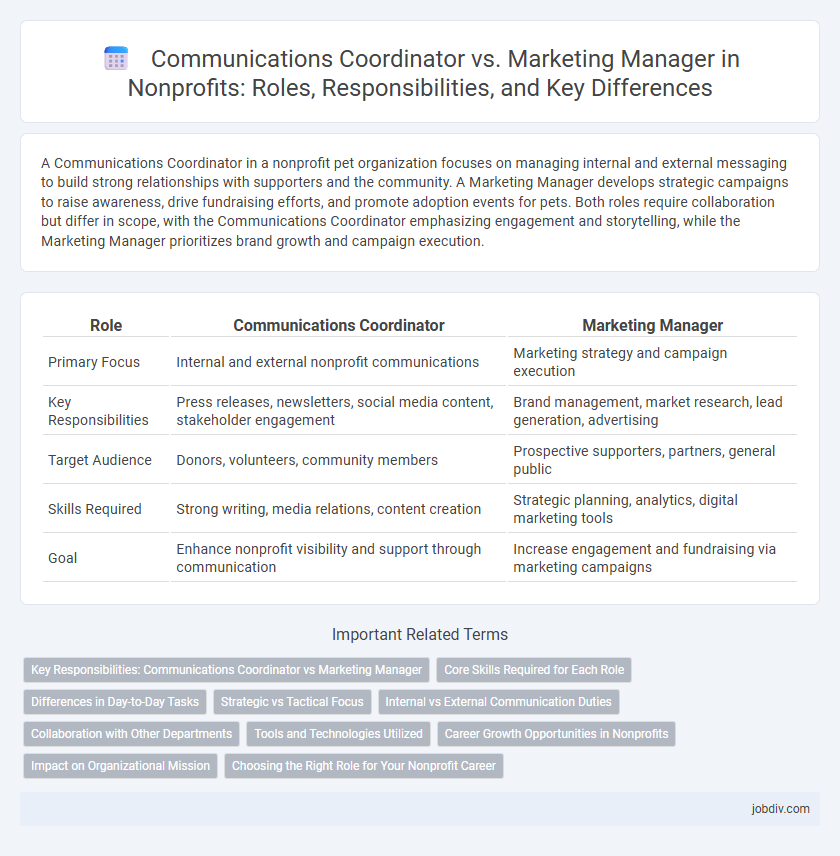A Communications Coordinator in a nonprofit pet organization focuses on managing internal and external messaging to build strong relationships with supporters and the community. A Marketing Manager develops strategic campaigns to raise awareness, drive fundraising efforts, and promote adoption events for pets. Both roles require collaboration but differ in scope, with the Communications Coordinator emphasizing engagement and storytelling, while the Marketing Manager prioritizes brand growth and campaign execution.
Table of Comparison
| Role | Communications Coordinator | Marketing Manager |
|---|---|---|
| Primary Focus | Internal and external nonprofit communications | Marketing strategy and campaign execution |
| Key Responsibilities | Press releases, newsletters, social media content, stakeholder engagement | Brand management, market research, lead generation, advertising |
| Target Audience | Donors, volunteers, community members | Prospective supporters, partners, general public |
| Skills Required | Strong writing, media relations, content creation | Strategic planning, analytics, digital marketing tools |
| Goal | Enhance nonprofit visibility and support through communication | Increase engagement and fundraising via marketing campaigns |
Key Responsibilities: Communications Coordinator vs Marketing Manager
A Communications Coordinator manages internal and external messaging by crafting press releases, coordinating media relations, and maintaining social media channels to ensure consistent organizational storytelling. A Marketing Manager develops and implements strategic campaigns, oversees audience targeting and market research, and analyzes performance metrics to drive donor engagement and fundraising success. Both roles collaborate to enhance brand visibility, but the Communications Coordinator focuses on message delivery, while the Marketing Manager prioritizes campaign strategy and growth.
Core Skills Required for Each Role
A Communications Coordinator in a nonprofit typically requires strong writing, public relations, and media outreach skills to effectively manage internal and external communications, while a Marketing Manager needs expertise in strategic planning, digital marketing, and data analysis to drive donor engagement and campaign success. Both roles demand proficiency in storytelling and brand messaging, but the Communications Coordinator prioritizes content creation and stakeholder communication, whereas the Marketing Manager focuses on market research, campaign design, and performance metrics. Understanding audience segmentation and nonprofit mission alignment is essential across both positions to maximize outreach impact.
Differences in Day-to-Day Tasks
A Communications Coordinator in a nonprofit typically manages internal and external messaging, crafts press releases, coordinates social media content, and supports event promotion to maintain consistent organizational voice. In contrast, a Marketing Manager focuses on strategic campaign development, audience segmentation, budgeting, and analyzing marketing metrics to drive donor engagement and fundraising growth. While both roles overlap in content creation, the Communications Coordinator emphasizes message dissemination, whereas the Marketing Manager prioritizes market research and campaign performance optimization.
Strategic vs Tactical Focus
A Communications Coordinator in a nonprofit typically concentrates on tactical execution, managing day-to-day communications such as social media updates, event promotion, and content creation to ensure consistent messaging. In contrast, a Marketing Manager focuses on strategic planning by developing comprehensive marketing campaigns, analyzing audience data, and aligning communication efforts with the organization's long-term goals. The Marketing Manager drives brand positioning and donor engagement strategies, while the Communications Coordinator supports these initiatives through operational tasks and immediate outreach efforts.
Internal vs External Communication Duties
Communications Coordinators in nonprofit organizations primarily manage internal communication, ensuring clear, consistent messaging among staff, volunteers, and stakeholders to foster engagement and alignment with the mission. Marketing Managers concentrate on external communication duties, developing strategies to promote the organization's brand, attract donors, and increase public awareness through campaigns, social media, and media relations. Both roles are critical for cohesive messaging but differ in audience focus, with Communications Coordinators enhancing internal collaboration and Marketing Managers driving external outreach and growth.
Collaboration with Other Departments
Communications Coordinators in nonprofits often work closely with program staff to ensure messaging accurately reflects project goals and outcomes, fostering transparency and engagement with stakeholders. Marketing Managers collaborate with fundraising and development teams to design campaigns that boost donor acquisition and retention, aligning marketing strategies with revenue objectives. Both roles require seamless interdepartmental communication to synchronize outreach efforts and amplify the nonprofit's mission impact.
Tools and Technologies Utilized
Communications Coordinators in nonprofits often use tools like email marketing platforms (e.g., Mailchimp), social media management software (e.g., Hootsuite), and basic graphic design tools (e.g., Canva) to enhance outreach and engagement. Marketing Managers typically leverage more advanced technologies, including customer relationship management (CRM) systems (e.g., Salesforce), data analytics tools (e.g., Google Analytics), and comprehensive marketing automation platforms (e.g., HubSpot) for campaign strategy and performance tracking. Both roles require proficiency in digital content creation and SEO tools to maximize visibility and donor interaction.
Career Growth Opportunities in Nonprofits
Communications Coordinators in nonprofits often gain foundational experience in content creation, stakeholder engagement, and media relations, positioning them for advancement into strategic roles such as Marketing Manager. Marketing Managers typically oversee campaign development, donor outreach, and brand strategy, offering broader leadership responsibilities and influencing organizational growth. Career growth opportunities for both roles depend on expanding skill sets in digital marketing, data analytics, and cross-department collaboration to drive fundraising and mission impact.
Impact on Organizational Mission
A Communications Coordinator in a nonprofit primarily ensures clear, consistent messaging that strengthens donor relationships and community engagement, directly supporting the organization's mission. A Marketing Manager develops strategic campaigns to increase visibility and fundraising effectiveness, amplifying outreach to broader target audiences. Both roles drive mission impact by aligning communication efforts with organizational goals, yet the Marketing Manager often influences long-term growth through data-driven strategies.
Choosing the Right Role for Your Nonprofit Career
A Communications Coordinator in a nonprofit typically manages internal and external messaging, media relations, and content creation, playing a critical role in maintaining consistent brand voice. In contrast, a Marketing Manager focuses on strategic campaigns, donor engagement, and fundraising initiatives to drive growth and visibility. Evaluating your skills in storytelling, data analysis, and campaign management will help determine the best fit for advancing your nonprofit career.
Communications Coordinator vs Marketing Manager Infographic

 jobdiv.com
jobdiv.com